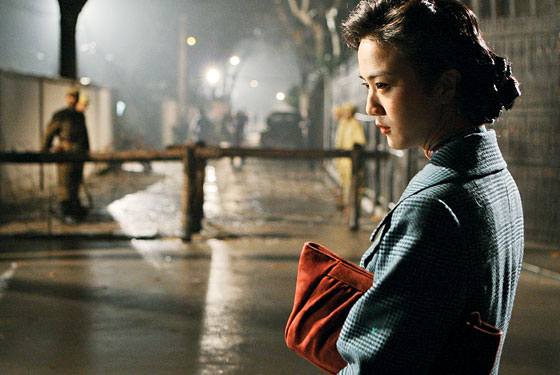|
Reviews of Recent Independent, Foreign, & Documentary Films in Theaters and DVD/Home Video
Directed by Ang Lee. Written (in Mandarin, with English subtitles) by Wang Hui Ling & Schamus, based on the short story “Se, Jei” by Eileen Chang. Produced by Bill Kong, Lee & James Schamus. Director of photography Rodrigo Prieto. Edited by Tim Squyres. Music by Alexandre Desplat. Released by Focus Features. Country of Origin: Hong Kong/USA/China. 158 min. Rated NC-17. With: Tony Leung, Tang Wei, Joan Chen, Wang Leehom & Anupam Kher. Director Ang Lee has publicly doubted that America will embrace his latest film, saying, “Its pace, its film language – it’s all very Chinese. It’s not very audience-friendly for a market like the U.S.” That may be true, but not surprisingly, roughly 30 minutes have been cut for its Chinese release, making it an entirely different movie from this international version. Though gorgeous to look at and, at least for its first half, an engaging potboiler, it’s hard not to come away from Lust, Caution remembering mostly the wildly acrobatic bedroom romps, where the fast-cut edits and explicitness contrasts with the otherwise old-fashioned storytelling. The sex scenes are more than convincing, whether the couplings were simulated or not. (Think Bruno Dumont’s Twentynine Palms, or, on second thought, don’t.) In this game of sexual espionage, Lee has outsexed Paul Verhoeven. (Who would have imagined that Michael Douglas and Sharon Stone’s f--- of the century could look so tame?) Even when it comes to violence, Lee tops Verhoeven, demonstrating in one graphic and brutal scene how hard it is to kill a man with kitchen utensils (perhaps a reference to another primal how-to in Alfred Hitchcock’s Torn Curtain). Producer James Schamus, an avowed Josef von Sternberg fan, cowrote the script, and it shows. Though based on a short story by Eileen Change, Lust, Caution is the offspring of Sternberg’s Dishonored, with Marlene Dietrich as a spy in love with her sap, and Shanghai Express, with the star as prostitute Shanghai Lilly. The spirit of the icon permeates Lust, and not only the plot. Dietrich croons “You Do Something to Me,” during the opening mahjong game, while Destry Rides Again is playing at the local cinema. In 1938, virginal college girl Chia Chi auditions for a patriotic drama, a benefit for the Resistance (at this point, Japan has not yet taken Hong Kong). Flushed with confidence and naïveté, she and the rest of her drama club set their sights on bigger game – to kill a well-placed Chinese collaborator, Mr. Lee (Tony Leung). For her new role as the wife of a business man, Chia Chi transforms into a cosmopolitan woman, Tai Tai, beautifully outfitted in blue silk, and befriends the wife of Mr. Yee and infiltrates the Yee household. However, it’s not the languid and lingering shots or the upfront sensuality that will detract audiences. In the first hour, the audience is on Chia Chi’s side, but the moment she first encounters Mr. Yee, audience and character part; you simply don’t sense why she’s drawn to him. For a pulpy melodrama centered on romance, Leung only intermittently gives off low-flying sparks, too subtly playing (at least out of the bedroom) the Chinese collaborator who will later become in charge of Shanghai’s secret police. That’s not to say that the mystery behind what Yee is thinking isn’t compelling. One facial tick could mean anger or fear.
But Verhoeven’s Black Book, though full of coincidences and implausibilities, has a more believable love affair between its determined and
lusty young heroine, who, like Chia Chi, whores herself for the Resistance (this time in Nazi-occupied Holland), and her paramour, a German captain.
He actually relaxes in her arms, cracking an occasional smile. If Lee and Schamus really wanted to offer a tribute to von Sternberg or Dietrich,
they should have included a mocking (or any kind of) sense of humor. Instead, Chia Chi/Tai Tai’s seduction is purely carnal.
Kent Turner
|

